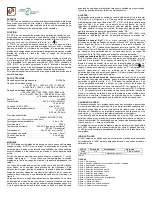
Configuration
Antenna Installation
14
www.javad.com
Make sure cords are located so that will not be stepped on, tripped over, or otherwise subjected to
damage or stress. Do not operate equipment with a damaged cord or plug – replace immediately.
To reduce the risk of damage to the equipment, pull by the plug body rather than the output cord
when disconnecting the equipment.
Do not operate the supply if it has received a sharp blow, been dropped, or otherwise damaged. Do
not disassemble the supply.
Warning:
Before connecting the external power source and the modem, make sure that the power source matches the
modem’s voltage and current requirements.
2. Antenna Installation
Warning:
WARNING! To avoid serious damage of the equipment, do not use the radio without the antenna.
Select the type of antenna that best fits your application and the one that offers the highest dB gain. In
addition, setup your system in the highest possible location to minimize obstacles between the
transmitting and receiving systems. Always place the antenna on the highest point available. At a
minimum, set the antenna to at least ten feet above the terrain using an antenna mast.
3. Connecting HPT401BT and Computer
Once you have established a connection between the modem and the computer, you will be able to:
• Configure the modem and its components
• Send commands to the modem
Use ModemVU to load new firmware to the modem.
3.1. Connecting through serial port
To configure, or maintain HPT401BT, you need to connect the modem and a computer using an Data-Ser-
Pwr Cable, DB9/DB15/SAE (1,8m) p/n 14-578108-02. .
Figure 2. Accessory Data-Ser-Pwr Cable
Default parameters for Serial port are:
• Baud Rate:115200
• Data Bits:8















































